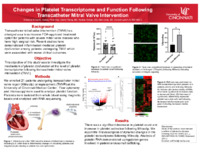Changes in Platelet Transcriptome and Function Following Transcatheter Mitral Valve Intervention
Main Article Content
Abstract
By Makayla Williams, Biological Sciences; Kelsey Premba, Medical Sciences; Diarra Niang, University of Cincinnati; Auriela Howze, University of Cincinnati; Alex Cody, University of Cincinnati; Demetrio Sharp Dimitri, University of Cincinnati
Advisor: Donald Lynch
Presentation ID: 236
Abstract: Background: Mitral valve disease, affecting 2.5% of population, occurs when the valve does not close properly leading to inadequate flow of blood and development of heart failure. Left untreated, mitral valve disease is associated with significant mortality and over $8 billion annual cost to the health system. Up to 50% of patients are not candidates for surgery; therefore, transcatheter based approaches have emerged. Recent studies have demonstrated platelet dysfunction, platelet loss, and inflammation following transcatheter mitral valve intervention (TMVI). Our study investigated mechanisms of platelet dysfunction at level of platelet transcriptome following TMVI. Methods: Twenty-one patients were enrolled prior to Mitraclip (N = 15) or transcatheter mitral valve replacement (TMVR, N = 6) at the University of Cincinnati. Flow cytometry was used to evaluate platelet for: 1) activation, 2) turnover and 3) clearance. Platelet spreading was evaluated with fluorescent microscopy. Platelets were isolated from 5 subjects pre and post Mitraclip after which RNA sequencing was performed. Results: After TMVI, there was a significant decrease in platelet count (P < 0.0001). There was no significant difference in thiazole orange or Annexin V expression. There was a trend towards a decease in markers of platelet activation. Analysis of variance of platelet RNA demonstrated upregulation of 661 genes and downregulation of 329 genes following Mitraclip. Pathway analysis demonstrated an upregulation of genes involved in endosomal trafficking, including Sortin Nexin 11 (SNX11) which was previously not known to be in platelets. Conclusion: Our study demonstrates inflammatory reprogramming of platelets among patients undergoing Mitraclip.
